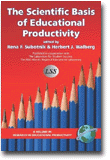
The Scientific Basis of Education Productivity
Edited by:
Rena F. Subotnik, American Psychological Association
Herbert J. Walberg, University of Illinois - Chicago
A volume in the series: Research in Educational Productivity. Editor(s): Susan J. Paik, Claremont Graduate University.
Published 2006
This volume is not primarily concerned with what students should learn, nor even how they should learn. Rather it concerns how we can discover the best means and conditions for teaching them in school, at home, and in society. Expressed more explicitly, we seek to find out how students can learn efficiently or productively as much as possible within a given amount of time and resources. As in agriculture, medicine, public health, and modern industries, we can turn to rigorous science as one of the best sources for informing ourselves.
The intended audiences are not only scholars in a variety of academic disciplines but also research consumers, including educators, policymakers, parents, and citizens who seek principles to critically separate valid from invalid claims for the efficacy and efficiency of education products, personnel, and policies.
Initial versions of the chapters were discussed at a national invitational conference sponsored by the Laboratory for Student Success (LSS), the mid-Atlantic regional educational laboratory, at Temple University Center for Research in Human Development and Education. LSS operates under a contract with the U.S. Department of Education’s Institute of Education Sciences.
CONTENTS
Preface. Introduction and Overview, Rena F. Subotnik and Herbert J. Walberg. Evidence-Based Reform: Experimental and Quasi-Experimental Research Considered, Susan J. Paik. Scientific Formative Evaluation: The Role of Individual Learners in Generating and Predicting Successful Educational Outcomes, T.V. Joe Layng, Greg Stikeleather, and Janet S. Twyman. Blending Experimental and Descriptive Research: The Case of Educating Reading Teachers, Elizabeth S. Pang and Michael L. Kamil. The Enhancement of Critical Thinking: With Decades of Converging Evidence, Meta-Analyses with Large Effect Sizes, and Societal Need, Would You Allow Your Child to Be Assigned to a “Control” Group?, Diane F. Halpern. Improving Educational Productivity: An Assessment of Extant Research, Herbert J. Walberg. The Scientific Basis for the Theory of Successful Intelligence, Robert J. Sternberg. Science, Politics, and Education Reform: The National Academies’ Role in Defining and Promoting High-Quality Scientific Education Research, 2000–2004, Lisa Towne. American Board for Certification of Teacher Excellence: Applying Research to Develop a Standards-Based Teacher Certification Program, Kathleen Madigan. Evidence-Based Interventions and Practices in School Psychology: The Scientific Basis of the Profession, Thomas R. Kratochwill. The Institute of Education Sciences’ What Works Clearinghouse, Robert Boruch and Rebecca Herman. Conclusions and Recommendations, Herbert J. Walberg and Rena F. Subotnik. About the Contributors.
-
Paperback978-1-59311-449-7
Web price: $45.04 (Reg. 52.99)
-
Hardcover978-1-59311-450-3
Web price: $80.74 (Reg. 94.99)
- eBook9781607525196

-
 Addressing The Achievement Gap
Addressing The Achievement Gap
-
 Advancing Education Productivity
Policy Implications from National Databases
Advancing Education Productivity
Policy Implications from National Databases
-
 Can Unlike Students Learn Together?
Can Unlike Students Learn Together?
-
 Efficiency, Accountability, and Equity
Issues in Title 1 School Wide Program Implementation
Efficiency, Accountability, and Equity
Issues in Title 1 School Wide Program Implementation
-
 High-Achieving Latino Students
Successful Pathways Toward College and Beyond
High-Achieving Latino Students
Successful Pathways Toward College and Beyond
-
 Optimizing Student Success in School with the Other Three Rs
Reasoning, Resilience, and Responsibility
Optimizing Student Success in School with the Other Three Rs
Reasoning, Resilience, and Responsibility
-
 Successful Reading Instruction
Successful Reading Instruction

